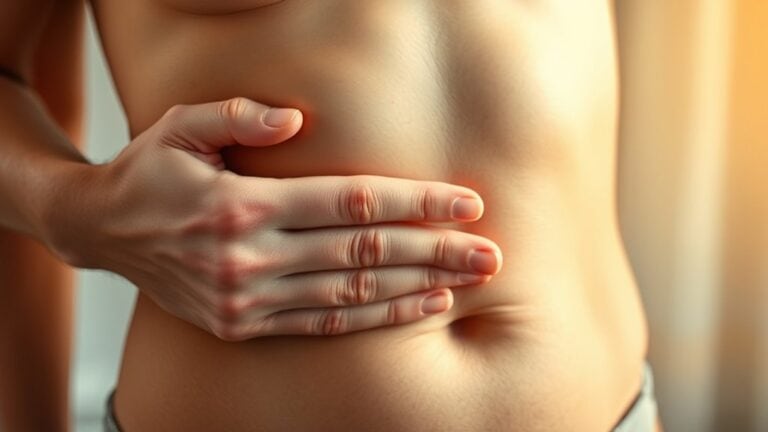Experiencing headaches every time you eat may feel frustrating, but you’re not alone in this struggle. Many factors can contribute to these discomforts, from food allergies to even dehydration. It’s essential to understand what could be triggering your pain because identifying the cause is the primary step toward relief. Let’s examine some common culprits that could be causing your headaches, and together, we can find ways to manage them effectively.
Food Allergy or Intolerance
As it relates to headaches that arise after meals, one major player you could wish to contemplate is food allergy or intolerance.
Food allergies can provoke an immunological response, where your body releases histamines in reaction to trigger foods like dairy or gluten, resulting in headaches.
On the other hand, food intolerance couldn’t come with dramatic symptoms but often leads to discomfort and digestive symptoms, with common offenders like wheat and MSG.
To identify your specific triggers, consider keeping a food diary. Tracking what you eat can help pinpoint foods that lead to headaches.
An elimination diet, guided by a healthcare professional, is another effective method to uncover food sensitivities that might contribute to those annoying symptoms after eating.
Dehydration and Electrolyte Imbalance
Upon reflecting on what could provoke headaches after a meal, dehydration and electrolyte imbalance mightn’t be at the top of your list, but they’re worth considering.
Dehydration happens as your body loses more fluids than it takes in, leading to headaches from reduced blood flow to your brain. Since your brain is around 80% water, staying hydrated is vital for overall cognitive function and diminishing headache risk.
Salty foods can worsen this through causing electrolyte imbalances, further increasing your headache chances. Aim for 8-10 cups of water daily to stay hydrated.
Keep an eye on your urine color; clear, pale yellow indicates good hydration, while dark yellow is a red flag for dehydration! Recall, hydration is fundamental.
Blood Sugar Fluctuations
After exploring how dehydration impacts your health, it’s essential to take into account another player in the headache game: blood sugar fluctuations.
Should you ever experience a headache after eating, low blood sugar may be the culprit. At the time you consume high-sugar foods, you can spike your blood sugar, leading to a rapid drop within a few hours, known as postprandial hypotension. This can trigger those pesky headaches.
To help manage migraines and prevent these fluctuations, focus on balanced meals that incorporate proteins, fibers, and healthy fats. Eating consistent meals throughout the day can also stabilize your blood sugar.
Temporomandibular Disorder (TMJ)
Should you’ve ever felt a nagging headache after a meal, it could be linked to Temporomandibular Disorder, or TMJ. This condition affects your jaw and can cause pain while you chew, along with those pesky headaches.
Comprehending the symptoms and how to manage them can make a big difference in your comfort and wellness.
Symptoms of TMJ Disorder
It’s no surprise that discomfort in your jaw can lead to a range of frustrating symptoms, especially at the moment you’re trying to enjoy a meal.
Should you be contending with TMJ disorder, you may observe:
- Jaw pain or tenderness, making chewing difficult.
- Clicking or popping sounds when moving your jaw.
- Muscle tension that leads to headaches or earaches.
- Restricted movement, making it tough to open your mouth widely.
Stress and teeth grinding can worsen these symptoms, leaving you feeling frustrated and uncomfortable.
It’s crucial to recognize these signs, as TMJ disorder can take a toll on your daily life. Being aware of how discomfort and muscle tension manifest is the initial step toward relief.
Managing TMJ-Induced Headaches
Managing TMJ-induced headaches can feel overwhelming, especially at the moment you’re simply trying to enjoy a meal.
These headaches often stem from jaw discomfort and tension that can become worse while eating. Should you grind your teeth, it can increase both the frequency and intensity of your headaches.
To help relieve this discomfort, consider muscle relaxation techniques, like gentle stretching and mindfulness exercises. Dental splints can also protect your teeth and reduce tension.
Physical therapy might help strengthen your jaw muscles and alleviate pain. In the event that stress is a contributor, finding effective stress management strategies is essential.
Don’t hesitate to consult a dentist or medical provider who can guide you through a personalized management plan. You deserve relief!
Alcohol Consumption and Its Effects
While you could enjoy a glass of wine or a cold beer after a long day, alcohol can sometimes come with a side of headache that’s hard to ignore. Here’s why it happens:
- Alcohol leads to dehydration, causing fluid loss and headaches.
- Congener substances in drinks like red wine can trigger vascular responses, increasing headache likelihood.
- Histamines released during alcohol metabolism might induce headaches in sensitive individuals, often alongside nausea.
- Individual tolerance levels vary; some feel pain after little alcohol, while others can consume more before noticing issues.
To help, consider reducing your intake or choosing low-histamine beverages.
Should headaches persist, chatting with your healthcare provider could be wise.
Keep in mind, grasping your body’s reactions is key!
Gastrointestinal Disorders and the Gut-Brain Connection
Upon experiencing a headache, it’s not always just a sign of stress or lack of sleep; occasionally, it’s your gut sending distress signals. Gastrointestinal disorders, like IBS or GERD, can create inflammation and digestive distress that trigger headaches.
The gut-brain connection means that whenever your digestive system is struggling, it could communicate that discomfort to your brain, causing pain. For instance, should you have had too much histamine-rich food, like aged cheeses, your body might react with migraines.
Dysbiosis, an imbalance in gut bacteria, can further amplify inflammation, making headache relief tougher to achieve.
Focusing on gut health is essential; verify you’re eating well, managing stress, and seeking solutions to improve your digestive health for a happier head.





